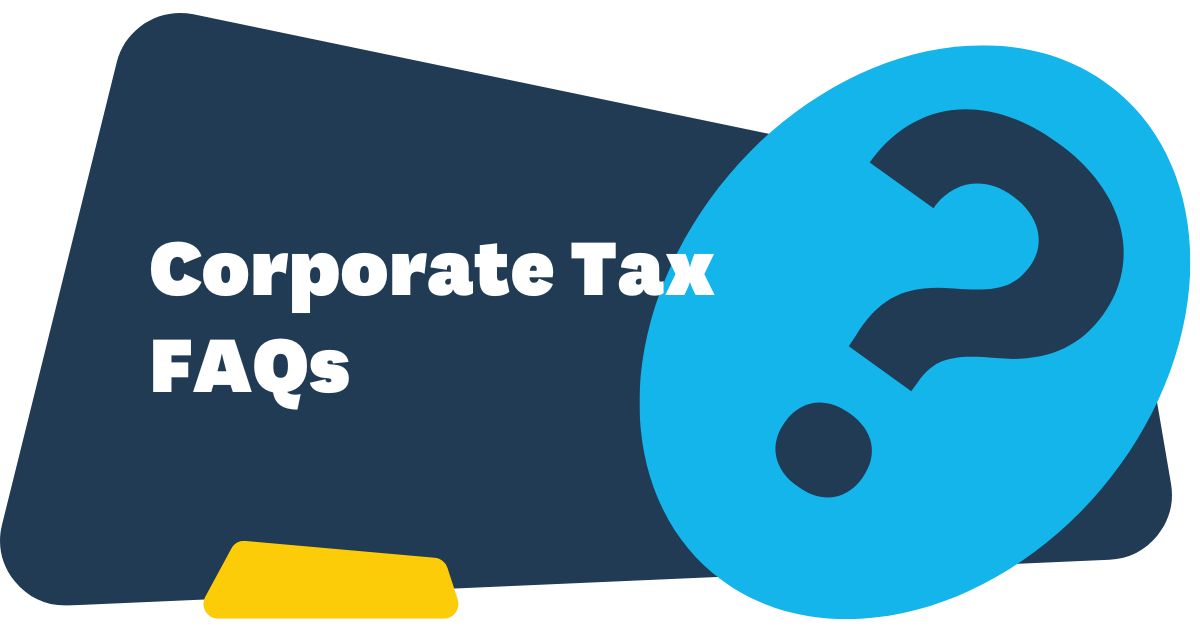Corporate Income Tax FAQs

This information offers guidance on the UAE Corporate Tax (CT) regime. For comprehensive details, refer to the Federal Decree-Law No. 47 of 2022 on the Taxation of Corporations and Businesses (Corporate Tax Law) available here.
What is Corporate Tax
Corporate Tax is a direct tax on the net income or profit of corporations and businesses. It is also known as "Corporate Income Tax" or "Business Profits Tax" in some regions
Who is subject to UAE Corporate Tax
UAE Corporate Tax applies to:
- UAE-incorporated juridical persons.
- Foreign juridical persons managed and controlled in the UAE.
- Foreign juridical persons operating through a Permanent Establishment or with a taxable nexus in the UAE.
- Natural persons engaged in business activities in the UAE.
How should businesses prepare for UAE Corporate Tax
- Review the Corporate Tax Law and supporting information from the Ministry of Finance and Federal Tax Authority.
- Determine if and when your business is subject to Corporate Tax.
- Understand your business’s registration, filing, and record-keeping requirements under the law.
- Regularly check for updates and guidance.
What is a Corporate Tax Period in the UAE?
The Tax Period is the financial year used for preparing financial statements, typically the Gregorian calendar year unless a different 12-month period is used
What are the UAE Corporate Tax rates?
For Natural and juridical persons:
- 0% for Taxable Income up to and including AED 375,000
- 9% for Taxable Income exceeding AED 375,000
For Qualifying Free Zone Persons:
- 0% on Qualifying Income
- 9% on non-Qualifying Income
Does the 0% Corporate Tax rate apply to each business?
Yes, the 0% rate applies to each Taxable Person's income up to AED 375,000, regardless of the number of businesses operated. However, for Tax Groups, the threshold is shared. Attempts to artificially separate businesses to benefit from the threshold multiple times will be penalized
Will natural persons be subject to UAE Corporate Tax?
Yes, natural persons will be subject to UAE Corporate Tax if they generate an annual turnover exceeding AED 1 million from a 'Business' or 'Business Activity' in the UAE
What is considered a ‘Business or Business Activity’ conducted by a natural person that is subject to tax?
A natural person is subject to UAE Corporate Tax when engaging in any Business or Business Activity that generates an annual turnover over AED 1 million. This excludes income from:
- Employment
- Personal investments
- Real estate investments
Is employment income subject to UAE Corporate Tax?
No, salaries and wages from employment contracts, including allowances and bonuses, are not subject to UAE Corporate Tax.
Is Personal Investment Incomes subject to UAE Corporate Tax
No, personal investment income and Real Estate Investment income earned in a personal capacity are not subject to UAE Corporate Tax.
Personal Investment income includes income from investments made in a personal capacity, such as interest or dividends, and excludes income from commercial businesses or activities requiring a UAE license.
Real Estate Investment income is derived from investment activities related to land or property in the UAE, provided these activities do not require a UAE license
What is a juridical person?
A “juridical person” is an entity recognized under UAE or foreign law with a legal personality separate from its founders, owners, and directors. Examples include limited liability companies, foundations, public or private joint stock companies, onshore trusts, and other entities with separate legal personality under UAE mainland or Free Zone regulations. UAE branches of domestic or foreign juridical persons are extensions of their parent entities and not separate juridical persons.
Will a sole proprietorship or civil company be treated as a juridical person for Corporate Tax purposes?
No, sole proprietorships and civil companies are not treated as juridical persons. However, natural persons conducting business through these structures may be subject to Corporate Tax if they undertake relevant business activities
Who is exempt from UAE Corporate Tax?
- UAE Federal and Emirate Governments and their departments and authorities.
- Companies wholly owned by Government Entities performing Mandated Activities (listed in a Cabinet Decision).
- Businesses engaged in extracting UAE Natural Resources or related non-extractive activities subject to Emirate-level taxation.
- Qualifying Public Benefit Entities listed in Cabinet Decision No. 37 of 2023 (click here for the list).
Entities that may be exempt upon approval include:
- Qualifying Investment Funds.
- Public or private pension or social security funds meeting specific conditions.
- UAE juridical persons wholly owned and controlled by exempt entities conducting specified activities (as per paragraph (h) of Clause 1 of Article 4 of the Corporate Tax Law).
Will small businesses receive any UAE Corporate Tax relief?
Yes, businesses with revenues of AED 3 million or below can elect for ‘Small Business Relief’ for tax periods ending on or before December 31, 2026. This means they will be treated as having no taxable income. An election must be made in the Corporate Tax Return for the relevant tax period.
What is “Small Business Relief”?
Small Business Relief allows eligible businesses to avoid calculating and paying Corporate Tax and complying with regular reporting requirements. Eligible businesses with revenues of AED 3 million or below in the current and prior tax periods can elect to be treated as having no taxable income. If revenue exceeds AED 3 million in any tax period, they will no longer be eligible for Small Business Relief
Who can claim Small Business Relief for UAE Corporate Tax purposes?
For tax periods ending on or before December 31, 2026, the following can claim Small Business Relief if their revenue is AED 3 million or below:
- Natural persons
- Legal entities that are not part of a Multinational Enterprise Group or a Qualifying Free Zone Person.
How to calculate Corporate Tax?
If a business earns taxable income of AED 1 million, what is the UAE Corporate Tax payable? If eligible for Small Business Relief, no Corporate Tax is payable. Without the relief, the tax liability is calculated as:
- Taxable income up to AED 375,000 at 0%: AED 0
- Taxable income above AED 375,000 at 9%: (AED 1,000,000 - AED 375,000) x 9% = AED 56,250 The total Corporate Tax payable is AED 56,250, reducible by any available tax credits.
What is the Free Zone Corporate Tax regime?
The Free Zone Corporate Tax regime provides a 0% Corporate Tax rate on income from qualifying activities and transactions for Free Zone companies and branches meeting specific conditions.
Who is a Qualifying Free Zone Person?
A Qualifying Free Zone Person meets all conditions of the Free Zone Corporate Tax regime:
- Maintains adequate substance in a Free Zone.
- Derives Qualifying Income.
- Has not elected for the regular UAE Corporate Tax regime.
- Complies with arm’s length principles and transfer pricing rules.
- Maintains audited financial statements.
Failure to meet any condition disqualifies the entity from the regime for five tax periods
How are Qualifying Free Zone Persons taxed under the UAE Corporate Tax regime?
They are taxed at 0% on income from Qualifying Activities and transactions with other Free Zone Persons, unless the income is from Excluded Activities. Income from a Permanent Establishment in mainland UAE or abroad is taxed at 9%, with relief available to avoid double taxation
When do the benefits of the Free Zone Corporate Tax regime expire?
The benefits expire at the end of the tax incentive period specified in the Free Zone legislation unless extended by a Cabinet Decision.
What conditions must be satisfied to benefit from the Free Zone Corporate Tax regime?
- Maintain adequate substance.
- Derive Qualifying Income.
- Not elected for the regular UAE Corporate Tax regime.
- Comply with arm’s length principles and transfer pricing rules.
- Maintain audited financial statements.
What is Taxable Income?
Taxable Income for a Tax Period is the accounting net profit (or loss) of the business, adjusted for specific items as defined in the Corporate Tax Law.
What standards must be used to prepare Financial Statements?
For UAE Corporate Tax purposes, Financial Statements should be prepared according to the International Financial Reporting Standards (IFRS). If the Revenue is below AED 50,000,000, IFRS for SMEs is acceptable. For Revenue below AED 3,000,000, the Cash Basis of Accounting is permissible
What UAE Corporate Tax adjustments to the Financial Statements will be required to calculate Taxable Income?
Adjustments to the accounting net profit (or loss) include:
- Unrealised gains/losses (subject to the realisation principle election).
- Exempt Income such as dividends.
- Gains/losses from transfers within a Qualifying Group.
- Gains/losses from business restructuring transactions (Article 27 of the Corporate Tax Law).
- Non-allowable deductions.
- Adjustments for transactions with Related Parties and Connected Persons.
- Transfers of Tax Losses within a group if conditions are met.
- Incentives or tax reliefs.
- Any other adjustments specified by the Minister.
How are capital gains taxed?
Capital gains from the disposal of assets are included in annual Taxable Income like other business income. Capital gains on share sales may be exempt from Corporate Tax if certain conditions are met
What expenditure will be deductible for the purposes of calculating Taxable Income?
Generally, business expenses incurred to derive Taxable Income are deductible, subject to exceptions and restrictions in the Corporate Tax Law. The timing of deductions may vary depending on the expense type and accounting method. Capital assets' expenditure is typically recognized through depreciation or amortization over the asset's economic life. Dual-purpose expenditures must be apportioned, with the business-related portion being deductible.
What expenditure will be non-deductible for the purposes of calculating Taxable Income?
Bribes, fines, penalties, and expenses related to exempt income or non-business losses. Restrictions also apply to interest expenditure
Will Value Added Tax paid be deductible for UAE Corporate Tax?
Only irrecoverable input VAT may be deductible. Recoverable VAT amounts are not deductible
Will remuneration paid to management be a deductible expense for Corporate Tax purposes?
Yes, management remuneration is generally deductible, subject to:
- Reflecting market rates if paid to directors, owners, or their relatives (Connected Persons). Excess amounts are non-deductible.
- Adherence to transfer pricing rules for management fees to Related Parties. Excess amounts above arm’s length price are non-deductible.
What is the tax treatment of employee entertainment?
Employee entertainment costs are deductible if incurred for business purposes
Are doubtful debts allowed as deductible expenditure?
Yes, doubtful debts are deductible, aligning with the International Financial Reporting Standards (IFRS).
What are “Tax Losses”?
Tax Losses arise when the total deductions a business can claim exceed its total income subject to tax for a given Tax Period, resulting in negative Taxable Income.
Will the UAE Corporate Tax regime allow prior year Tax Losses to reduce Taxable Income?
Yes, Tax Losses can be offset against future periods' Taxable Income, up to 75% of the Taxable Income in each of those periods. Any unused Tax Losses can be carried forward indefinitely
What is Withholding Tax?
Withholding Tax is Corporate Tax collected at the source by the payer on behalf of the income recipient. It typically applies to cross-border payments of dividends, interest, royalties, and other income types
Does the UAE Corporate Tax regime have Withholding Tax?
A 0% Withholding Tax may apply to certain types of UAE-sourced income paid to non-residents. Practically, no Withholding Tax is due, and there are no registration and filing obligations related to Withholding Tax for UAE businesses or foreign recipients of UAE-sourced income. Withholding Tax does not apply to transactions between UAE Resident Persons.
What records should I keep for UAE Corporate Tax purposes?
Taxable Persons must prepare and maintain financial statements for calculating their Taxable Income. They should also keep all documents and records supporting the information in their Corporate Tax Return or any other filings with the Federal Tax Authority. Exempt Persons must maintain records to support their exempt status.
How long must I keep my records for UAE Corporate Tax purposes?
Records and documents should be retained for 7 years following the end of the relevant Tax Period.
Who is required to prepare and maintain audited financial statements?
The following must prepare and maintain audited financial statements:
- A Taxable Person with Revenue exceeding AED 50 million during the relevant Tax Period.
- A Qualifying Free Zone Person.
Will I need to submit my Financial Statements to the Federal Tax Authority?
The Federal Tax Authority may request Financial Statements to be submitted in the prescribed form and manner within the specified timeline.
Who will be required to register for UAE Corporate Tax?
All Taxable Persons must register and obtain a Corporate Tax Registration Number. Non-Resident Persons earning State Sourced Income without a Permanent Establishment or nexus in the UAE do not need to register. Persons seeking exemption from Corporate Tax must register before applying for exemption
Is there a registration threshold for UAE Corporate Tax?
Yes there is registration thresholds for existing taxable persons and newly established taxable persons. details available here
How do I register for UAE Corporate Tax?
Taxable Persons can register electronically through the EmaraTax Portal.
I am already registered for VAT purposes. Do I have to register for UAE Corporate Tax?
Yes, Taxable Persons must register for UAE Corporate Tax, even if already registered for VAT.
Will a UAE company with several UAE branches be required to register each branch separately for UAE Corporate Tax?
No, branches are not separate legal entities and are treated as part of their UAE head office. The UAE company must include details of all branches in the registration form.
How often will UAE businesses need to file a UAE Corporate Tax Return?
Businesses need to file one UAE Corporate Tax Return per Tax Period, due within 9 months following the end of the Tax Period.
I did not make a profit for the Tax Period; do I have to file a UAE Corporate Tax Return?
Yes, Taxable Persons must file a Corporate Tax Return even if no profit is made. Filing is essential to ensure that any Tax Losses can be used to offset future Taxable Income
When do I need to pay my UAE Corporate Tax liability?
The Corporate Tax liability must be paid on or before the end of the 9 months following the end of the relevant Tax Period

